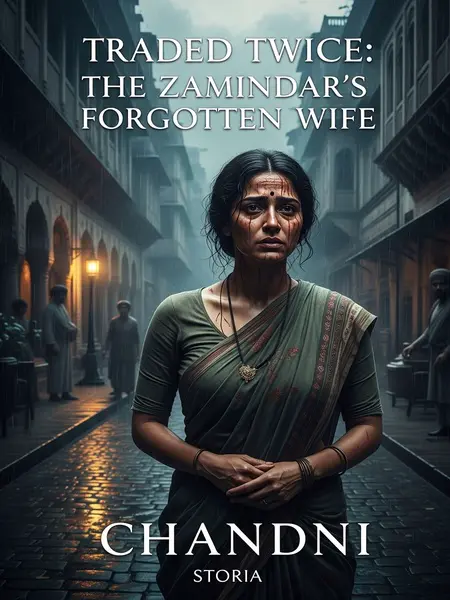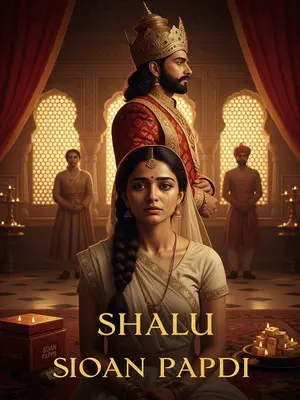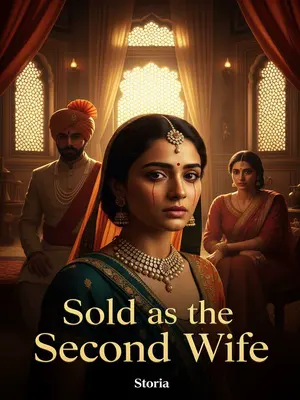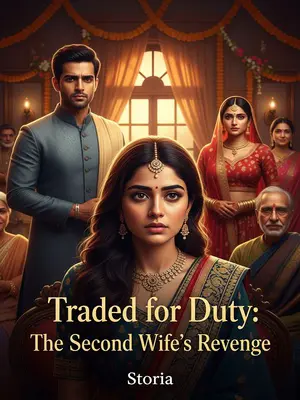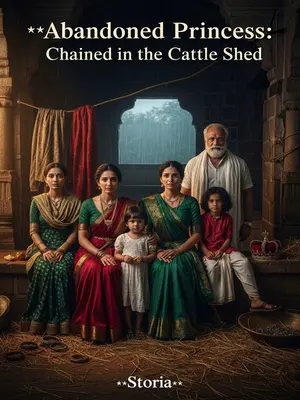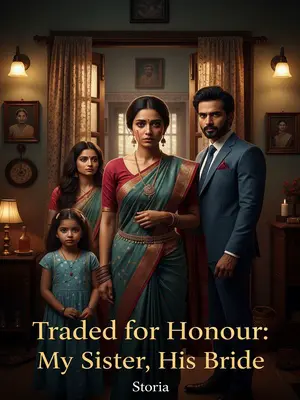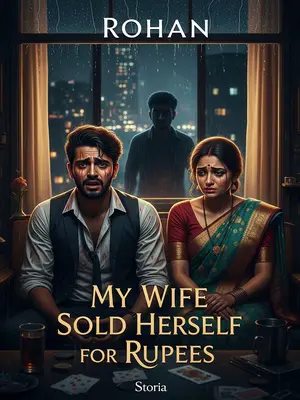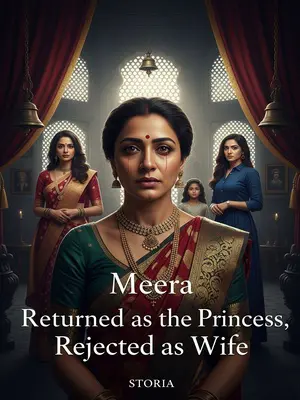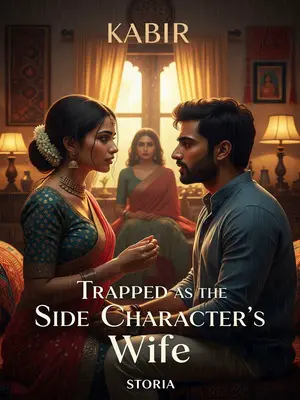Chapter 3: Ashes of Twelve Years
My mother was a vaidya. She once treated the old matriarch of the zamindar’s house for three months.
Her nimble fingers would crush tulsi leaves and grind sandalwood for poultices, the air thick with the scent of herbs. The old matriarch, wrapped in silks, had taken a liking to my mother’s quiet competence, often sending for her even at the smallest sneeze. Our humble house filled with stories of the grand haveli—peacocks, endless roses, and forbidden rooms.
Later, when the old matriarch fell gravely ill again, the young zamindar came in person to seek my mother’s help.
He arrived on a rain-drenched afternoon, his kurta stained with worry. The neighbourhood children gawked at the shiny car outside our door. My mother offered him sweetened dahi in a chipped steel bowl, but he barely touched it, his eyes restless with anxiety for his grandmother.
But my mother had already died in childbirth. I was just ten years old then.
The world shrank to a single room, the air thick with the smell of burnt ghee from the diya, mixing with the sharp tang of winter wind sneaking through the cracks. The midwife’s cries and my stepmother’s curses echoed with the thunder outside. I clung to my soiled frock, the knowledge of being motherless heavier than any hunger.
I stammered, timid, forced by my stepmother to kneel by a bucket, my frostbitten, cracked, festering hands scrubbed raw with a rough coconut husk.
Lucknow winters bite deep. My hands split open, bleeding into dirty water as I scrubbed her sarees. My stepmother’s voice rang out, shrill and merciless, as I hunched lower, trying to disappear into the shadows.
"Wretched child, did you do this on purpose? These ruined hands are so clumsy, snagging my sarees and staining handkerchiefs with blood. Today, I’ll scrub a layer of your skin off!"
Her hands gripped my wrists, scraping the husk harder and harder against my skin. My cries went unheard, echoing in the cold kitchen. Neighbours never asked after me—they had their own daughters to worry about.
The pain made me cry out silently, tears streaming down my face.
I bit my lip until I tasted blood, determined not to give her the satisfaction. My tears mixed with the soapy water, invisible to all but the gods watching from the brass idol above the stove.
The young zamindar lashed out with a cane.
He arrived in a flurry, his anger like a summer storm. Without a word, he snatched the cane from my stepmother’s hand and struck the ground so hard the courtyard shuddered. My stepmother cowered, hissing curses as she retreated. I dared not move, uncertain if I was to be saved or punished anew.
He saved me, then bought me.
Just like that, I was plucked from misery and taken to the haveli. No farewells, no blessings. My stepmother thrust a bundle of old clothes at me, muttering, “Good riddance.” I wondered if I should thank or curse the zamindar, but in that moment, I only felt numb.
He sent me to a kothi and forgot about me.
The kothi was an old outbuilding at the estate’s edge, its walls green with damp, rooms echoing with memories of others before me. There, I learned to wait. For news, for purpose, for someone to remember I existed. I grew up among other girls, all with stories too heavy for their age.
When I was fifteen,
the young zamindar’s beloved had been married for two years. He refused to discuss marriage or take a second wife.
The talk in the servants’ quarters grew louder each day. “Arrey, zamindar saab will never remarry. He’s lost his heart somewhere, what to do?” Some said he was bewitched, others whispered about the shame it brought to the family. Still, the estate waited, as if holding its breath.
Rumours in Lucknow claimed the young zamindar was impotent, and the clan coveted the title, seeking to adopt an heir.
At the paan shop, uncles debated, “No child, no future, yaar. Sharma legacy will go to some distant cousin.” Aunties during pooja exchanged pointed glances, words as sharp as their bangles.
The old matriarch was furious, searching the mansion, kothis, and orphanages for all the young girls she deemed suitable.
Her silver hair was always tied in a bun, her walking stick tapping a fierce rhythm as she oversaw rows of trembling girls. Lists were drawn, matches considered, families summoned with laddoos and blessings. It was less a search for a bride than a solution to a legacy.
Over a hundred women waited for his selection.
The air in the courtyard was thick with hope and fear, each girl clutching a tiny cloth bag, eyes wide. Mothers wiped away sweat, whispering prayers to every god. Some offered bribes to the gardener for a word in the right ear.
The old matriarch said: "As long as you leave a descendant for the Sharma family, I won’t interfere with you any longer. You’ll have your freedom."
Her words were law. Some mothers wept, others glared, calculating their daughters’ chances. My heart hammered; this was not just a marriage, but a golden cage.
The young zamindar drank, full of resentment towards the old matriarch.
His anger was legendary—servants said even the peacocks avoided him. He would disappear into his study with Old Monk, emerging only when his voice was raw and eyes bloodshot. The scent of sandalwood could not mask his bitterness.
"If not for your contempt for the Singhs and insistence on breaking us apart, Meera would have married me long ago. How did things come to this?"
He slumped against the pillar, voice shaking, words thick with grief. The matriarch ignored his pain, her eyes hard as stone. “Family honour comes first,” she hissed, and the air between them crackled with old wounds.
The old matriarch clutched her chest in anger.
She pressed a trembling hand to her heart, bangles jangling. For a moment, I thought she might collapse, but she straightened, face flushed with fury. Even the cook ran for water, fearing the worst.
"Meera Sharma is cunning and pretends to be weak. A wife should be virtuous; she cannot shoulder the responsibility of managing the Sharma family."
Her voice sliced through the room. The younger women exchanged glances, some nodding, others looking away. Meera’s name became a curse and a blessing, depending on who spoke.
Their quarrel grew heated.
The air vibrated with their shouting, servants scurrying to distant corners. The matriarch’s stick tapped furiously, punctuating every accusation, while the zamindar retorted with words sharper than swords. I stood by the door, invisible, absorbing every word.
The old matriarch, nearly fainting with rage, threatened to dash herself against a pillar and follow the old zamindar in death.
She wept loudly, invoking ancestors, swearing to become a sati in spirit if not in flesh. The threat sent panic through the family—no one wanted the household haunted by her unfinished business.
The young zamindar relented. He looked up and swept his gaze over the women in the courtyard.
He exhaled slowly, shoulders sagging, scanning the faces before him. The courtyard fell silent, every girl holding her breath.
I had been watching him all along.
Behind my veil, my eyes followed his every move. I told myself I didn’t care, but my heart betrayed me, thumping wildly each time he glanced my way.
He looked at my face among the crowd, his gaze complicated.
For a second, I wondered if he recognised me, the girl he had once saved. His eyes lingered—a mix of curiosity, pity, and something unreadable. My breath caught in my throat.
After a while, he suddenly smiled.
A wry, almost sad smile—gone as soon as it appeared. But in that brief moment, hope flickered within me, fragile and reckless.
"Mother, as you wish." He called me over. "You, take off your dupatta."
He looked me up and down, like I was some new maid. "Tumhara naam kya hai?" His words, cold and formal, rang out in the silence. The crowd parted as I stepped forward, palms damp with sweat. I could feel every eye on me, waiting to see if I would comply.
Surrounded by onlookers, I felt chilled to the bone.
The sun was merciless, baking the stone courtyard, but a shiver ran down my spine. My knees trembled as I unclasped my dupatta, feeling as though I was being stripped bare before the whole world.
He looked down at me from above.
I tried to meet his gaze, searching for kindness or understanding, but found only distance. I was just another transaction in a line of bargains for family pride.
"I said take off your dupatta, did you hear? The rest of you, turn around."
His command brooked no argument. The other girls turned away, some whispering, others stifling giggles. My shame was absolute, my body exposed to the gaze of the only man whose opinion had ever mattered to me.
That day, I earned the right to stay, but also became the laughingstock of the entire courtyard.
The laughter echoed in my ears long after the crowd dispersed. I clung to my dignity, vowing never to forget the sting of that humiliation.
I bit my lip hard, my back pressed against rough neem bark, my body exposed to the sunlight in humiliation.
I pressed my body against the ancient tree, its roughness grounding me as my thoughts spun. I could feel the heat of a hundred stares, the neem’s sharp scent mingling with my shame. I promised myself I would never cry again in front of these people.
He despised my tears.
He scoffed, rolling his eyes. “Enough of this drama, Chandni. Women like you, always with your waterworks.” The other girls snickered, emboldened by his disdain. I clenched my fists, swallowing my pride.
"Women like you, aren’t you all eager to offer yourselves for money? Even if you resemble her a little, you’ll never be even a thousandth of what she is. Shut up. Don’t cry."
His words cut deeper than any slap, echoing the cruelties I’d heard all my life. I stared at the ground, determined not to let him see me break, even as my heart splintered.
My back ached in waves, wounds seeping blood, my skin torn—just like the handiwork of my stepmother years ago.
I stumbled as I walked away, my back stinging with each step. I remembered the coconut husk, the sting of salt in open wounds, and the cold comfort of being invisible. Some wounds, I realised, never really heal.
The person I had thought about for five years turned out to be like this.
All my childish dreams collapsed, replaced by the hard reality of the world I now belonged to. I understood, at last, the folly of hoping for kindness from men who traded women as easily as livestock.
Afterwards, I stayed.
The days bled into each other. I learned to move quietly, to keep my eyes lowered, to become useful but never noticeable. It was a kind of survival, a way of disappearing in plain sight.
The third night he came to sleep with me, looking at my face, he realised I had no name.
He looked me up and down, like I was some new maid. "Tumhara naam kya hai?" I hesitated, caught off-guard by the question, unsure if I should answer.
"From now on, you’ll be called Chandni."
His voice was soft, almost gentle. For a fleeting moment, I imagined this was an act of kindness—a new beginning. The other servants whispered about the name, wondering what it meant.
Fish eyes mixed with pearls.
Some said the name was ill-omened, a reminder that not all that glitters is gold. In the flickering lamplight, I wondered if I was meant to be a pearl or a fish eye, shining only in borrowed light.
I was the dead fish eye, pretending to be a precious pearl, just like his first love.
I wore the name as a mask, hiding my true self beneath layers of silence. Each day, I became more skilled at pretending, more adept at making myself indispensable, yet invisible.
I shook my head gently. "No, I have a name. My name is Chandni."
My voice trembled, but I met his eyes. For the first time, I let him see the anger burning inside me.
He punished my disobedience harshly.
That night, his anger was a storm. He shouted, throwing things, then gripped my arm hard enough to leave bruises. I rubbed my wrist, adjusting my pallu to hide the marks, determined not to cry in front of him. I would not give him that satisfaction.
I hurt so much that tears filled my eyes, but I kept insisting.
I repeated my name, again and again, as if by doing so I could reclaim a piece of myself. My body shook with pain, but my spirit held fast. I would not be erased.
"My name is Chandni."
The words became a mantra, an anchor in a sea of uncertainty. I clung to them, letting their weight steady me.
Chandni, the name you gave me yourself when you saved me—have you forgotten?
In the stillness of the night, I wondered if he remembered that rain-soaked day, the frightened child with bloodied hands. Perhaps not; perhaps he chose to forget.
Chandni, as in the bells and drums that sound at night, earnestly waiting for dawn.
The sound of temple bells at midnight, the distant beat of drums during Holi—these were the rhythms of my life, each one a reminder to hold on for another day.
It means, as long as you wait, things will get better.
This hope, fragile but persistent, was all I had left. I clung to it through every insult, every night spent alone, every moment of humiliation.
